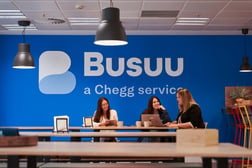A guide to business English training for L&D pros

With 1.75 billion people speaking English at a useful level (according to Harvard Business Review), it is undoubtedly the language of business. As the pressure to establish a common language across a global workforce grows, so does the challenge with finding the right approach to establish a good corporate English training programme. In this article, we’ll share a guide to set you up for L&D success through a list of 5 do’s and don’ts for your business English training plan.
-
Do: focus on accreditation. Don’t: cut back on quality progress indicators.
Before selecting a corporate English training programme, make sure that your course includes grading and accreditation. You can consider courses that are accredited under the Common European Framework of Reference (CEFR). This accreditation standard was developed to ensure educational transparency and to allow movement between countries for work or study within the European Union. Any business English course awarded by the CEFR should provide the necessary assurance that staff can utilise their skills in Europe and beyond.
-
Do: Set specific goals. Don’t: let your learning dictate your routine.
English is a notoriously difficult language and one of the richest, if not the richest in vocabulary. It’s therefore essential to structure your training programme from the start. Set specific goals for your team that are not only challenging but achievable. These could include, using business English to deliver a 15-minute presentation, hosting a Zoom call, or answering correspondence via email without referring to dictionaries or a thesaurus.
It’s equally important to set deadlines. Whether self-paced or working to a schedule, ensure your learners at least have a rough idea of when they would like to test themselves in real-life situations or complete their course as a whole. That way they're more likely to achieve what they otherwise might be tempted to put off.
-
Do: make learning flexible and personalised. Don’t: adhere to rigid timetables
To follow on from the last point, you should also focus on flexibility. There’s no point in embarking on the delivery of a programme without ensuring it can fit the schedules and direct interests of your learners. So, where learners are trying to improve their business English vocabulary, for instance, you can triple-check that the programme has elements that will simply put, support with Business English vocabulary. When it comes to flexibility, self-paced e-learning is useful here, and online corporate language training allows students to take bespoke English lessons any time, anywhere. This means staff will be more likely to complete their course as they fit it around their existing commitments.
-
Do: Contextualise your learning. Don’t: take a one-size-fits-all approach
Just as important as having the right tools, learners should know why they are learning and what they want to achieve too. You should work with your staff to discuss a plan of action. Ideally, this would include an analysis of their forthcoming commitments and career progression. So, you might want to ask questions like:
-
Where do you see yourself working in the future?
-
Who do you communicate with during working hours, and do you think an English course would improve these working relationships?
-
When working with people abroad, are most of your clients native or non-native when it comes to speaking English?
- Which business function do you work in or seek to develop your business English for?
Quizzing your staff on factors like these from the outset should not only help them identify key areas for their improvement but ensure they don’t waste time on elements of the course that might not be as useful as they anticipated.
-
Do: Collect feedback from staff. Don’t: over-rely on your course for assessment
Similar to the previous point, once your Business English course has come to an end, you should seek to analyse the outcomes of the training programme. Whether via interviews, surveys, or workshops with your team, ask your staff which areas they feel they did best in, vs. which areas they feel they still have room for improvement. This will help identify any skill gaps that might not have been picked up during the course. Allowing staff to share their experiences of the course is the only way to ensure they succeed in future L&D programmes, whether in English or another language they may be interested in learning.
Fastracking Business English training with Busuu
At Busuu, we are confident that our online self-paced and teacher-led methodology helps people learn to speak a new language, whether English or any of the other 12 languages we offer. Our language learning platform is not only accessible and engaging but time and time again is proven to drive results. According to a recent efficacy report learning a language on Busuu is 4 times faster than traditional means. Plus, on average, learners who use digital tools are 3 times more likely to be successful in their quest to learn a new language. With our scalable tool your learners benefit from:
-
Award-winning language courses for your employees
-
Targeted Business English materials
-
Tailored 1:1 and group lessons
-
Official level certification
-
Desktop and mobile experience
-
Complementary learning anywhere, anytime, with Offline Mode
-
A management platform to track learner progress
Want to find out more about how we can support you with your corporate English training plans? Get in touch with us today!
Discover similar posts
How Palladium achieved the five-star guest experience
The story of how a luxury hotel group used language learning to turn guest experiences into repeat ...
3 benefits to employee training your boardroom will actually listen to
According to SkillSoft’s 2014 survey of 500 UK businesses executives, only 54% believed that ...
How to Improve Customer Experience in Retail with Language Learning
Being aware of how important customer experience is in the retail industry, both in-store and ...
Why representation in resource images is crucial to successful diverse and inclusive language learning programmes, like Busuu's
This blog focuses on the importance of representation in the resources images used. Far from ...
Improving employee retention with language learning
Improving employee retention and increasing their satisfaction in the workplace is crucial and a ...
Busuu and L’Oréal Group: The Beauty of Languages
L’Oréal Group is the largest cosmetics group in the world.







